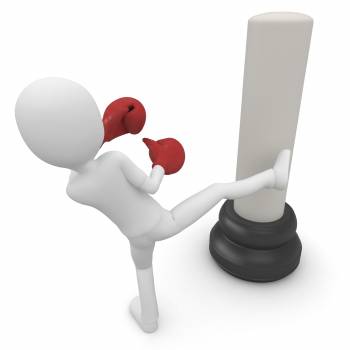Physiotherapy in Kitchener for Kickboxing
Competitive kickboxing is a sport with high potential for serious injuries due to the intense blows that are delivered and received as part of the fight.
 The term kickboxing itself is often used as a catch-all term covering boxing or many forms of martial arts, however in its true meaning ‘kickboxing’ is reserved for fights where both the feet and hands are used. In addition, true kickboxing is a standing sport therefore the match does not continue if a competitor reaches the ground, unlike some similar sports.
The term kickboxing itself is often used as a catch-all term covering boxing or many forms of martial arts, however in its true meaning ‘kickboxing’ is reserved for fights where both the feet and hands are used. In addition, true kickboxing is a standing sport therefore the match does not continue if a competitor reaches the ground, unlike some similar sports.
There are several organizations that sanction competitive kickboxing. Competitive kickboxing can be semi-contact, or full contact depending on the level of the competitors. High level competitors usually compete with full-contact whereas amateurs compete with semi-contact to decrease the chance of injury. The winner of the kickboxing fight is determined either based on a system of awarded points, or one where a knockout determines the winner. Rules regarding which kicks and punches are allowed is based on which style of kickboxing is being followed; American style, International style, or Japanese style. The fight rules followed including the level of contact allowed and the factor determining the winner of the fight (ie: point system versus a knockout) will both affect the types of injuries seen in the sport as well as the level of injury seriousness.
Although it is not necessarily the intent to injure, the nature of the sport means that injuries will occur, and will certainly occur if knocking your opponent out is the goal of the spar. Although common, traumatic injuries are not the only injuries that occur. Due to the repeated and intense motions required while kicking and punching even during training, overuse type injuries can also be common.
The most common kickboxing injuries include:
- Concussion
- Lacerations
- Contusions
- Neck pain
- Shoulder dislocations
- Shoulder tendonitis
- Finger fractures
- Low back pain
- Groin strain
- Hamstring strain
- Knee collateral ligament sprain
- Ankle ligament sprain








